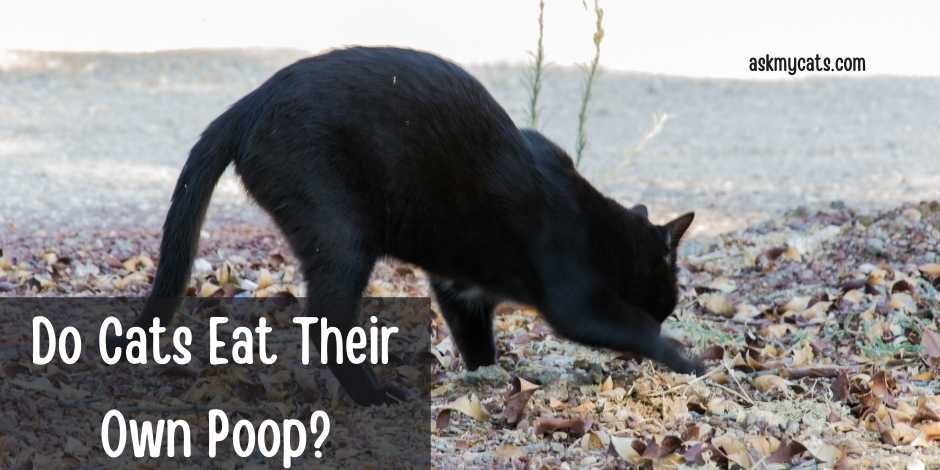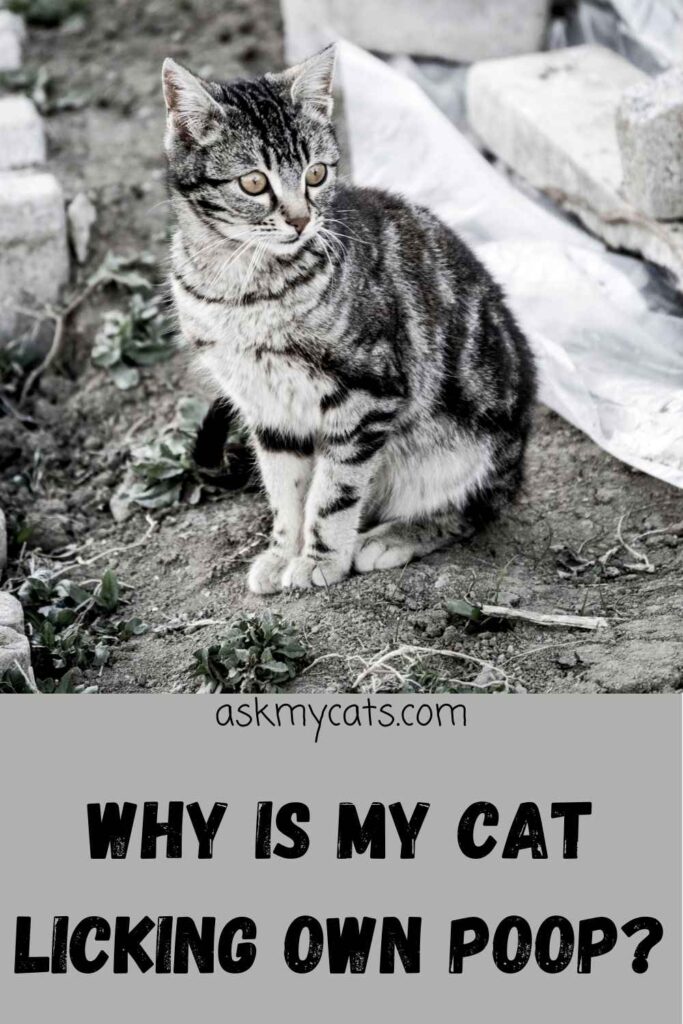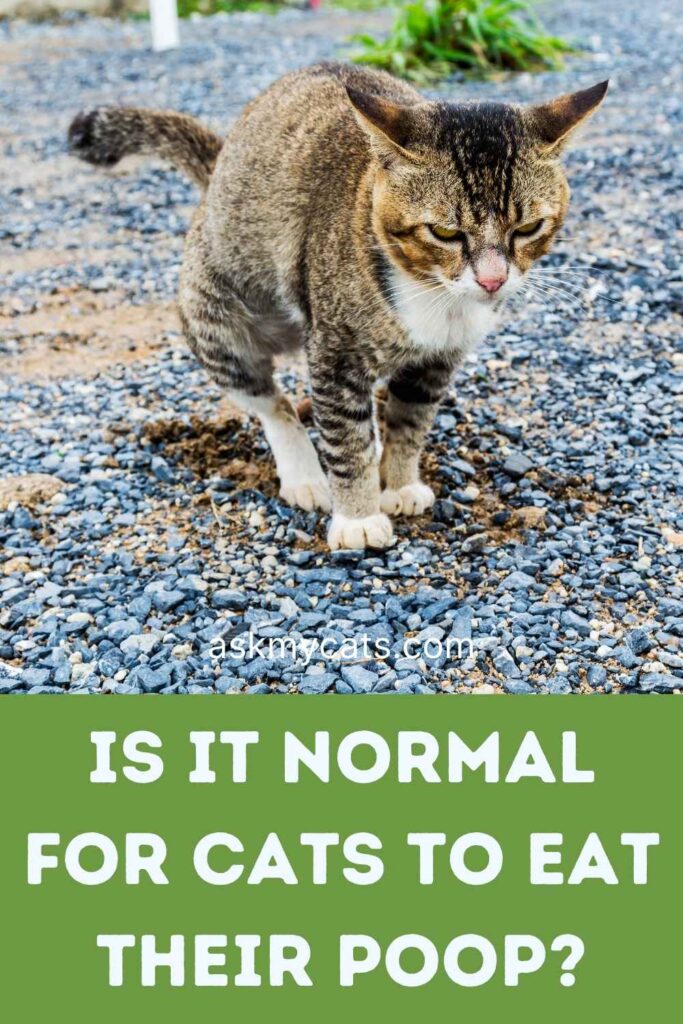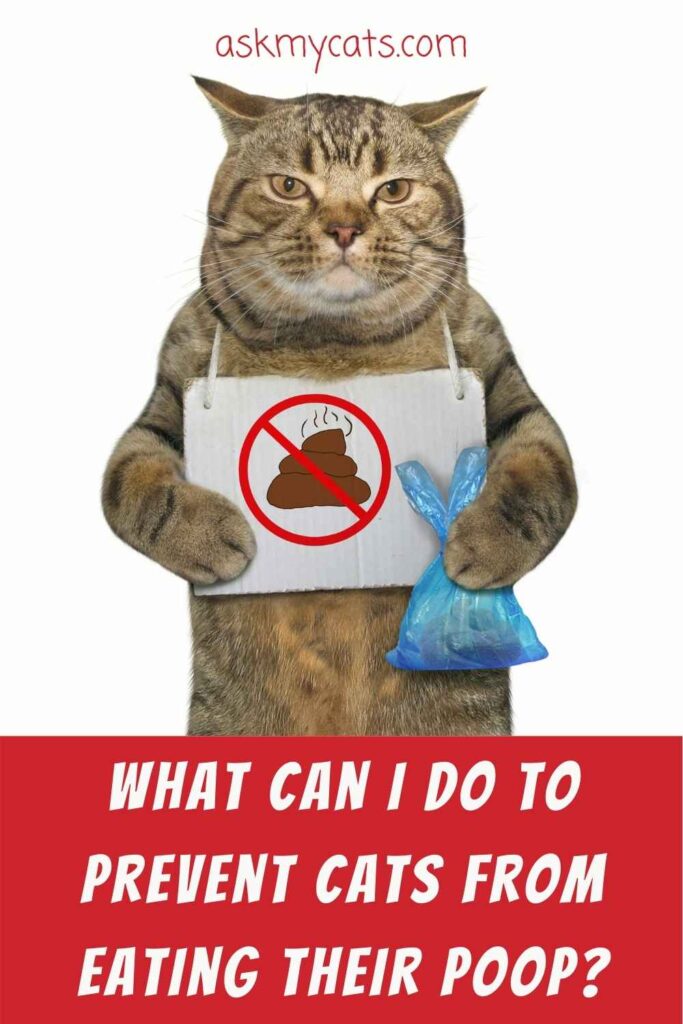You may see your cat eating dirt, mud, pebbles, soap, or other potentially harmful substances. The gastrointestinal tract is the most impacted organ system by this behavior, especially if foreign substances are ingested.
Cats may consume their own poop to keep their own spaces tidy. Coprophagia, on the other hand, is frequently the outcome of an underlying medical problem that causes an excessive increase in hunger. Cats will consume anything accessible to them, including their own feces, to fulfill their acute hunger.
You could observe the animal vomiting, having loose feces, or having diarrhea. The animal may show signs of weakness and lethargy. Let’s look into the matter closer!


Give Your Cat the Perfect Day
Get the Free Ebook!
Why Is My Cat Licking Own Poop?
Your cat may be licking its own poop for a variety of medical reasons, including a vitamin or mineral deficit, parasites, malnutrition, or certain illness conditions such as diabetes or thyroid disease.
When mother dogs and cats have litters, they eat their pups’ or kittens’ excrement to mask their scent while the litter is fragile and hidden in the den.
Even though the concept of coprophagia is revolting, there comes a time in a pet’s life when it is anticipated… When mother dogs and cats have litters, they eat their pups’ or kittens’ excrement to mask their scent while the litter is fragile and hidden in the den.
Beyond that, eating feces is just plain disgusting. Coprophagia is mostly caused by digestive problems, with the following three reasons requiring immediate attention:

1. Enzyme Deficiency
Cats may manufacture a few digestive enzymes on their own, but the remainder must be obtained from their diet. Enzyme shortage can lead your dogs to hunger, lose weight, and finally resort to eating their feces to acquire those vital nutrients.
A functioning pancreas is essential to your pet’s general health since it generates enzymes that aid in the digestion of nutrients from meals.
When your pet lacks these enzymes, the majority of the nutrients are not adequately digested and are simply excreted through their feces.
In other situations, cats may consume the feces of healthier animals. Rabbit feces have a high concentration of digestive enzymes as well as B vitamins. Many cats will eat rabbit droppings if they come upon them.
Deficient cats will “recycle” by eating enzyme-rich feces. I know it’s gross, but it’s true.
2. Microorganisms
Coprophagia can be caused by intestinal parasites. To keep the illness from spreading among the young, the senior members of a pack ingest the excrement instead.
It might be an inherited characteristic to protect young pack members from parasites in their lair.
We recommend that cats have their feces examined by a vet to ensure that they are parasite-free and that they follow a de-worming program.
Because even healthy cats can get intestinal parasites from ingesting feces, a good parasite management strategy is essential for all cats.
3. Deficiency In Diet
Cats fed exclusively processed, dry-food diets and eating no nutritious foods will seek alternative sources of digestive enzymes to compensate for their own enzyme deficit.
Cats with enzyme deficiencies, malabsorption, or who are fed low-quality diets might be litter box temptations for other cats in the household.
Many low-cost dry meals contain chemicals that are not bioavailable, so they pass through the intestine undigested; allowing scavenging cats to “recycle.”
4. Behavioral Problems
Coprophagia in cats can also be caused by behavioral factors.
Because they are frightened and disturbed, some cats, particularly those in kennels, may consume excrement.
According to research, cats that are penalized by their owners for improper elimination develop the belief that pooping is harmful in and of itself. As a result, they consume their excrement in an attempt to erase the evidence.
Another plausible explanation is that coprophagia is a characteristic shared by all canines — wolves, coyotes, and domesticated cats — and occurs when food is scarce.
Unfortunately, this is common in puppy mill dogs. Puppies that go hungry, are weaned too early, have to compete for a spot at a communal food dish, or are forced to remain for weeks in a cramped box with nothing to do are at a high risk of developing chronic stool-eating behavior that is difficult to break.
Coprophagic behavior can be learned as well. Older cats that have developed the unpleasant habit might transmit it to younger canines in the family.
You might also like to read about why does my cat play with his poop
Is It Normal For Cats To Eat Their Poop?
It is normal for cats to eat their poops because they are just cleaning the environment they belong to. Cats are regarded as being extremely clean creatures, yet they clean themselves using their tongues.
If your cat has stomach pain and defecates on themselves, they will most likely not clean it up. You wouldn’t want to lick your own feces either.

Although handling cat feces might be disgusting, it is rarely harmful. However, there is a worry that cat feces may contain Toxoplasma gondii, a parasite that causes Toxoplasmosis. Toxoplasmosis can also be contracted by eating the raw or undercooked meat.
For most people, toxoplasmosis isn’t a big deal because they either don’t get sick or only have mild flu-like symptoms.
It is of special concern to pregnant women, as the parasites can be passed on to the unborn child, causing birth abnormalities or even death.
While this may seem frightening, it’s important to note that getting these parasites through the litter box is not frequent.
Infected cats only excrete the parasite for a brief period of time, and the parasites aren’t infectious for at least 48 hours. That implies that cleaning out the litter box regularly lowers the chance of illness.
Pregnant mothers should delegate litter box tasks till the baby is delivered just to be safe. If that’s not an option, scoop and clean the box while wearing rubber gloves, then thoroughly wash your hands.
Keeping your cat indoors, as the ASPCA recommends for all cats, can also assist them to avoid getting this parasite.
Eating excrement is a perfectly natural and beneficial behavior at certain periods of life. Nursing or nursing moms will regularly lick their newborns to keep them clean and encourage them to use the toilet on their own.
This can be a difficult chore for moms of large litters, but we seldom observe concerns like stomach discomfort or poor health from these mothers. Coprophagia is a common occurrence in young dogs and cats.
It’s possible that being around a mother who licks them clean would encourage them to acquire the behavior. It might also be an innate need to ensure that the GI tract develops normally.
Babies are not born with bacteria in their GI tracts, and some experts believe that feeding feces to baby pets help their bodies organically house healthy gut bacteria (also known as intestinal flora).
Unfortunately, eating excrement may become a tough habit to overcome, especially when it is a natural occurrence. Cats may continue the behavior as adults, and while some may be able to break free on their own, you may need to seek help.
Can Cats Get Sick From Licking Their Poop?
There are dangers associated with coprophagia, even if it is not a serious medical problem. If your pet eats the excrement of an animal that is on medicine, some of the drugs may be absorbed by your pet.
Although rare, pets have been known to become ill after ingesting pain medicine or thyroid medication from another cat’s excrement.
In addition, your pet is at a higher risk of contracting illnesses like E. coli or Salmonella, as well as acquiring intestinal parasites.
Regrettably, this also puts you, the owner, at a small disadvantage. Allowing your cat to lick you is not a good idea, and you should wash your hands regularly until the problem is resolved.
What Can I Do To Prevent Cats From Eating Their Poop?
Pick up excrement in the yard or remove it from the litterbox as soon as possible to prevent your pet from ingesting it.

In these cases, an automated litterbox that collects the excrement as soon as your cat goes might be useful.
Some pet owners have found that putting spicy sauce on excrement in the yard works as a deterrent, although many pets aren’t offended at first, and too much might cause an upset stomach.
Another alternative is to put your pet on a leash or tether when they go outdoors so you can easily move them away from unpicked excrement.
If your pet’s present food isn’t of the highest quality, a diet adjustment may be beneficial. Changing to a fiber-rich diet may also be beneficial.
If your pet is eating another pet’s excrement, you should change their diet as well.
It’s crucial to talk to your veterinarian about making a dietary change to see whether it’s essential and to receive their advice on the finest nutritional alternatives and how to transition to a new food safely.
Increase the amount of exercise and activity your pet gets. Allow your children to play and engage with you and your family on a regular basis.
Toys that are enjoyable to chew and play with are recommended. This is particularly beneficial for cats suffering from anxiety or boredom-induced coprophagia.
Slowing down your pet’s eating using chew toys in the food, slow-release food toys, or bowls that are irregularly shaped and created particularly for pets that eat too fast may help your pet digest food better and improve excrement consistency.
Consider feeding your pet at regular intervals throughout the day so you can anticipate when he or she will need to go. This might save you from having to keep an eye on your pet to make sure they aren’t eating their own excrement.
Some pets are deterred from eating excrement by preventative medicine and food additives that alter the flavor. Make careful to feed them to the pet that is eating the excrement.
Probiotics, charcoal dog treats (for dogs only), canned spinach, and fresh pineapple have all been found to function as a preventative alternative for altering the excrement flavor on rare occasions.
Adolph’s Meat Tenderizer has also been found to be helpful as a preventative in certain cats; however, it might cause stomach distress if used excessively.
Medication for anxiety or obsessive behavior disorders might be rewarding at times. Your veterinarian can tell you what could help and whether or not your pet is healthy enough to take these drugs.
A muzzle, like a basket muzzle, can aid very stubborn pets that aren’t stopped from eating excrement in any other way.
The main disadvantage is that your pet may continue to consume poop while wearing the muzzle. Many owners may end up with quite a mess on their hands as a result of this!
The second difficulty is keeping an eye on your pet while they’re wearing their muzzle to make sure they don’t get tangled up in anything.
When your pet eats the excrement, don’t reprimand them or criticize them. This may exacerbate their fear and encourage them to continue eating excrement to escape punishment.
When your pet does not consume feces at a given chance, offer them a big incentive. This will motivate them to give up their bad behavior.
Frequently Asked Questions
Will cats lick poop off themselves?
Cats are famed for their cleanliness, yet they clean themselves with their mouths. If your cat has stomach pain and defecates on themselves, it is unlikely that they will clean it up. You wouldn’t want to lick your own crap, would you?
Why does my cat eat and poop so much?
Food allergies or intolerance can strike at any moment throughout a cat’s life. Hyperthyroidism, colitis, inflammatory bowel disease, and cancer are examples of cat diseases. Roundworms, for example, are a frequent parasite seen in cats.
Why do cats bury their poop?
The practice of methodically burying their waste originates from cats’ long history of marking their territory with urine and excrement. Smaller, weaker, or more submissive wild cats bury their excrement to keep stronger cats from feeling threatened.
Final Words
It’s critical to recognize that coprophagia is a tough habit to kick. Patience and a variety of techniques are the most likely ways to improve.
As you work through the situation, your veterinarian should be able to provide you with advice and suggestions. If you have any questions or concerns, don’t hesitate to contact your veterinarian.
Feel free to ask your questions in the comments section below!
